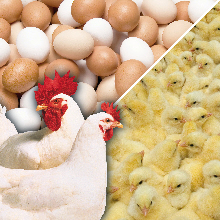



Hygiene Starts Before Hatching
UK - Eggs are not impervious to infection, according to Aviagen, offering advice on keeping hatching eggs as hygienically clean as possible.We are all aware of the health challenges poor hygiene can have on flocks but we are not always as observant when it comes to unborn chicks, after all, they quite literally come in a protective shell don't they?

Whilst the above observation is true, eggs are not impervious to infection. Poor litter quality and poor nest hygiene can lead to a build-up of bacteria within the egg. For a few seconds after lay, the cuticle or shell covering which is designed to keep out infection is still wet and at this point bacteria can and will penetrate the egg.
Managing litter and nest hygiene is of course, part of the day-to-day routine but there are other things which can also affect eggs and as a result, chick quality.
Eggs should be sanitised before they are placed into the incubators, which also should be sanitised, both before and after use.
There are also significant benefits in using a sanitiser, like formaldehyde in the hatchers to reduce bacterial load during pipping.
Egg collection and egg handling systems must be well maintained, any severe jolts, tight corners on a belt system or bumping can lead to hairline cracks in the shell. These may be microscopic but most will still be big enough to let in germs like E.coli.
The other means that these bacteria enter the egg is through moisture, so any condensation on eggs as a result of improper temperature control will also result in bacterial contamination of the chick.
To ensure eggs are in as hygienic an environment as possible, regular checks and cleaning of all equipment they come into contact with and is used for transport and storage is vital.












